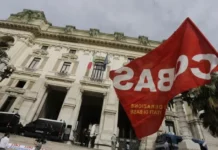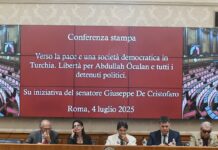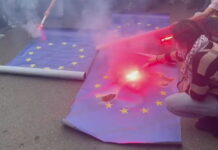by Piero Bernocchi
In my opinion, the interpretations of the European elections results, being circulated, are decidedly hasty and/or oversimplistic in the face of a situation that has also held some significant surprises, which require a thoughtful and deep reading. This is especially important, considering some entirely ideological and instrumental assessments used to support theses that were not at all legitimized by the elections; in fact, they were mostly refuted.
1) First of all, we need to understand the scope, quality, and quantity of the advancement of the far-right — considered by the majority of the observers as the most significant global sign of these European elections — , and even more so the reasons which made possible this advance. Firstly, the overall quantity of this growth is significantly lower than most predicted and, with the exception of France, does not appear to be disrupting the political balance in Europe. Certainly, the judgment is heavily influenced by the French result and, though to a lesser extent in my opinion, by the German result (the AfD had already reached 14% in previous national elections; the real news is the collapse of the governing parties). But, reasoning on a global European scale, at the end, the two far-right factions (ECR and ID) compared to the previous elections do not show any progress; on the contrary: in 2019 ID obtained 73 seats and ECR 62, today there has been a switch with ECR at 73 and ID at 58, but overall even 4 fewer seats, although the number of seats of the German AfD, expelled from ID, should be added: in short, far from the turmoil that the extreme right-wing European trumpets seemed to announce. Therefore, as far as the direct impact on the European Parliament is concerned (it is another matter to consider the influence of a clearly right-oriented France, which we will verify in the early national elections at the end of June), it appears almost irrelevant, at least numerically. The three components of the so-called “Ursula majority” exceed 400 seats and can manage the Parliament more or less as they have done so far, and even obtain, though complicated, external support from the ECR or from the part of it more loyal to Meloni.
2) In any case, beyond the specific weight of this rightward shift, regarding the reasons that would have determined this growth, a type of analysis is circulating that is both superficial and instrumental (as well as sponsored by Putin’s Russian and European propagandists): namely, that those who supported the defense of Ukraine lost and the “pacifist” and/or anti-Ukraine parties won. In reality, looking at the main data, it is almost always the opposite. Since the accusatory finger is pointed (with Putin’s supporters at the forefront) at Macron and Scholz, it is worth emphasizing that neither of them actually lost (at least not primarily) for supporting Ukraine. Macron had long since collapsed in popular support, not because of his position on Ukraine (although his recent statements were decidedly unbearable) but because of his anti-social economic policy, culminating in the imposition of the disastrous pension reform package. Macron had long been polling well below 20%, and economic/social issues have always been decisive among the reasons for this collapse. Not to mention that, for more than a year, Macron distinguished himself in the European landscape with his sometimes even ridiculous willingness to dialogue with Putin. Something similar can be said of Scholz: great managerial incapacity in terms of economic and social policies, and also great indecision and confusion even in supporting Ukraine, offered in a fluctuating and inconsistent manner.
3) Then, moving beyond the France-Germany dichotomy, it should be noted that most of the far-right did not play the pacifist card at all, nor did they give centrality to the ongoing wars. Le Pen and Bardella spoke as little as possible about war, Ukraine, and Russia (given their bad conscience about past support for Putin) or Palestine and Israel; the same goes for Vox in Spain and the Austrian FPÖ.As for Italy, Meloni has been the staunchest supporter (with much more consistency and determination than Macron and Scholz) of Ukraine and Israel and was rewarded with a three-point advance compared to the general elections, unexpected by all commentators, and the only case in Europe of a ruling party, after almost two years of navigating through a stormy phase, having constantly to plug the chain of own goals coming from her miserable and shameless entourage; and a similar success, though numerically smaller, went to Tajani’s Forza Italia, at the forefront of Italy’s commitment to Ukraine; while Salvini, who played the “pacifist” card heavily, was saved by the incredible Vannacci who, with his 530,000 votes (out of two million total voters for the League), avoided the catastrophe of a final 6-7%. Then, if we look at the “pacifist” center-left (I can’t consider M5S to be left-wing), we see that the ultra-“pacifist” Conte recorded the clearest defeat among Italian parties, losing more than 30% compared to the general elections and pre-election polls; while Santoro, who conducted an election campaign talking only about “peace,” and boarding a raft of pro-Putin and Ukraine-hating figures, took the usual beating that these hastily formed lists receive, stopping at a poor 2%, despite the strong notoriety and media exposure of the megalomaniac and self-centered former protagonist of talk shows for decades. Even in the PD, also committed to military support for Ukraine, were Decaro, Bonaccini, Nardella, Ricci, Gori who got serious votes (with some, like Decaro, over 500,000, or Bonaccini, about 400,000, with significantly more preferences than Schlein) while the ultra-“pacifist” of the last hour, Tarquinio, who even called for the dissolution of NATO, received very few votes and was elected by only a few dozen more votes than Morani. I don’t mention AVS because it seems clear that the quantitative leap did not come from their positions on the war but from an until recently unforeseeable factor, namely Nicola Fratoianni’s ability (former young man already sharp at the beginning of the century, when he was the only one from Bertinotti’s “brood” in the no-global movement to understand how to move in politics) to seize the extraordinary resource of Ilaria Salis (175,000 preferences) and that, certainly smaller but still significant, of Mimmo Lucano, (with a good 30% of personal votes for the two, out of the total 6.7%): and their votes came both from M5S and from young first-time voters and even from the traditional abstentionism of a large part of the “historic comradeship.”
The final clarifying data in this sense is the left-wing result in France. The surprising Glucksmann (son of the well-known “ex-nouveau philosophe” of yesteryear), who revived the Socialist party, maintained a constant pro-Ukraine line and, while attacking Netanyahu, reserved similar attacks for Hamas, Jihadist Islamism, and Iranian dictators. Despite being directly attacked by Mélenchon, who dedicated a hostile campaign against him, labeling him a “warmonger” and “Zionist,” he reached a surprising 14%, leaving Mélenchon, who opposed support for Ukraine and was very lenient towards radical Islamism, at about 8%, slightly more than half of the PS votes.Finally, if a mathematical figure is needed to close the argument, a simple calculation of the seats in the new European Parliament suffices: the parliamentary groups supporting Ukraine and opposing the Russian invasion are the EPP (191 seats), Socialists and Democrats (135 seats), Renew (83 seats), Greens (53 seats), ECR (71 seats), totaling 533 seats out of 720. In short, it does not seem that Putin has much to celebrate for Macron and Scholz’s fall.
4) Another notable surprise — perhaps the biggest in these elections in perspective and for the consequences it might have — has been little considered in the initial comments, perhaps due to embarrassment after three years of exalting the “millenarian” climatism of Greta Thunberg, and are that the climate-environmental issues, which should have favored a significant green rise, have instead mostly had the opposite effect. What very few had noticed until recen time is that much of the European right, as a key argument in these elections, after nationalism and security and anti-migrant alarms, gave maximum emphasis to opposition to the “green deal,” i.e., a strong questioning of an energy transformation accused of imposing high costs and a strong depressive impact on industrial and social balances. In other words, the radical right almost everywhere stood to block significant transformations in terms of energy supply, renewable sources, and prices considered too burdensome for various industrial and social categories: more or less what Trump has been preaching for years and which will be one of the main themes of his campaign for November. Well, this propaganda paid off for the right, while it surprisingly penalized the Greens at the European level, whose group in Brussels recorded a net loss of 20 seats, about 25%.
5) And now, let’s come to the vote in Italy. The clear winners (apart from the exceptional performance of AVS [Alleanza Verdi-Sinistra]) were the two major parties, reigniting a sort of neo-bipolarism (albeit with a well-established right-wing pole and a still quite uncertain left-wing pole). FdI [Fratelli d’Italia], which gained 3 points compared to the national elections, is a surprise, both because no party that has governed in Europe in recent years has advanced, and due to the many missteps made by the riffraff surrounding Meloni that have placed burdens on the leader, who nevertheless held on almost alone, despite being penalized by the unfortunate fascistoid brood she has surrounded herself with. The young woman has undeniable dialectical skill and solid political craft, knows how to navigate and manage every communicative tool; and all this, in my opinion, comes from something that none of her competitors possess: the experience of someone who has been involved in politics within far-right movements and organizations since the age of 14, with training in public speaking, continuous dialogue with segments of society, and a natural histrionic talent that she has gradually refined.
Skills that I personally do not see in Schlein, the other winner with the PD in these Italian elections, who nevertheless had the merit of keeping all the pieces of the “PD puzzle” together, not following through on the initial outbursts against those she called the “caciques” of the PD and announced she wanted to marginalize. Only to be forced to understand that the real strength of the PD, which makes it a de facto governing party, is precisely that dense network of local, municipal, and regional administrators who, if well motivated, bring in a flood of votes not only at the local level but also at the national level: with a Decaro sweeping the South with his haul of half a million votes (more than double Schlein’s, who was competing in two constituencies) or Bonaccini with his 400,000 votes, always in a single constituency, and the others already mentioned, all above two hundred thousand preferences. As for Salvini, he is the other substantial loser, along with Conte, among the major parties. Sure, he has saved his skin for now, but only by massacring his structural base, the northern-autonomist one, which had also produced a not insignificant number of administrators and who paid heavily for the openly fascistoid choice of that Vannacci who, on his own, took more than a quarter of the League’s votes but annihilating the northerners of the historical Bossian League: to the point that Veneto, a historical stronghold of the League, produced the largest advance ever of FdI, with Meloni’s supporters breaking the 37% barrier, reducing the “League of administrators” to minimal terms.
6) As for the other minor losers, the “two capons of Renzo» [from Manzoni’s Promessi sposi], as someone brilliantly defined them, since they continued to peck at each other throughout the electoral campaign and didn’t stop even afterwards, that is, Renzi and Calenda, it wouldn’t even be worth talking about, if not — besides expressing our disdain for the two most megalomaniacal, narcissistic, and solipsistic characters in Italian politics— to add that their miserable “little figure” and their self-destruction should receive the homage and thanks of Tajani who, thanks to the two wretches who cleared the centrist field by self-nullification, has surprisingly revived a party, Forza Italia, that seemed defunct with its founder [Berlusconi]. FI thus becomes, also thanks to surpassing the League, a stabilizing force of the Meloni government which, riding on an almost 48% overall (4.5 points more than in the general political elections) is a candidate to last, barring major unforeseen events, until the end of the legislature, given the permanent fragmentation of the opposition which the success of the PD I do not think will be enough to bridge, at least at the national level.Lastly, let’s talk about AVS. The European exploit, like other cases of opinion votes in the past European elections, could remain circumscribed and not have significant effects at the national level, or act as a starter for a significant role in Italian politics. It will be up to the Fratoianni-Bonelli duo (often called the “cat and the fox”, where, however, it is rather the former who has already proven his maneuvering ability since his involvement in the early 21st-century no-global movement) to show they have strategic strength and projects, as well as good tactical ideas, avoiding being co-opted as a spare wheel of the PD, but above all equipping themselves with strong and significant local structures and a constant presence in social and trade union movements (and there, perhaps avoiding, or at least downsizing, the evident current collaterality with the CGIL).
Piero Bernocchi
P.S. I did not highlight a nevertheless “historic” fact, the prevalence, for the first time in the history of Italian national elections, of abstentionism which beat electoral participation: a good 26.3 million Italians did not go to vote (about 51%). Although I am a political and trade union activist— with about 58 years of hopefully respectable, global and permanent social commitment, nationally and internationally— I have abstained many times in political elections. However, I have never given abstention (indeed, I wrote an essay against this illusory vision of elections, which can be read on my website www.pierobernocchi.it) any salvific or progressive value, especially in Italy where parties have long learned to shrug off even such abnormal abstention figures, continuing calmly on their way. However, the fact remains that, even if it does not influence the behavior of individual parties, it is undeniable that the institutional policy of seeing 51% of the population detached from the vote, and then not caring at all, casts a conspicuous discredit on liberal democracy and undoubtedly aids the propaganda of illiberal, authoritarian, or openly dictatorial regimes towards what they will increasingly credit as “illusory and non-substantial democracy”, for which, therefore, it would not even be worth fighting.





















